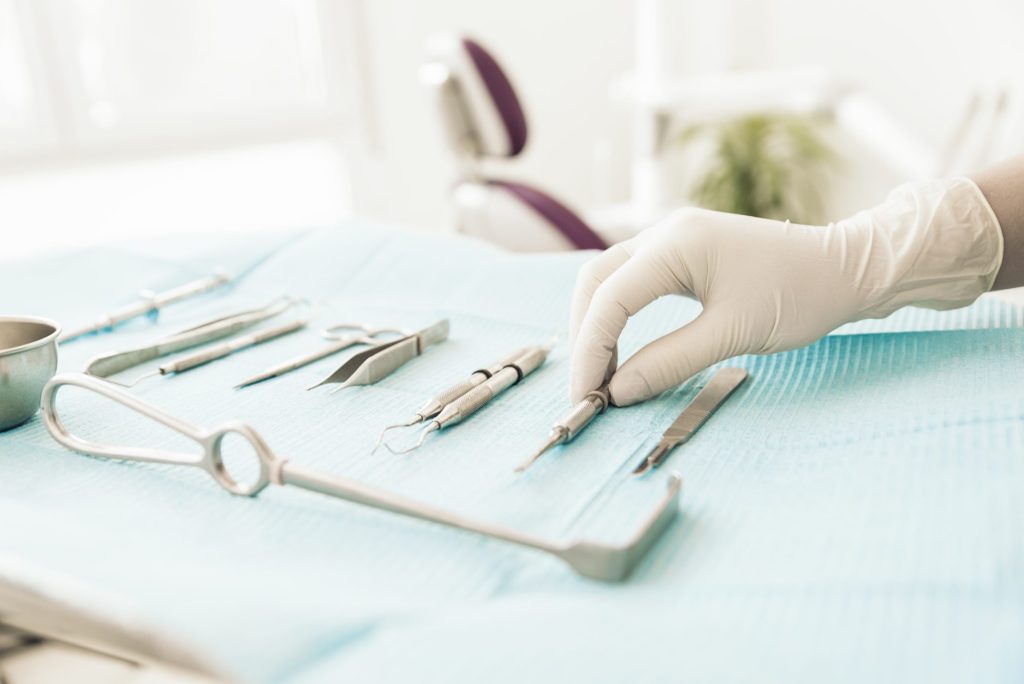Most dentists complete four years of undergraduate school to earn a bachelor’s degree. They then attend dental school for another four years to earn a DDS (doctor or dental surgery) or DMD (doctor of medicine in dentistry). Within dentistry, there are also several areas in which an individual (who has completed dental school) might choose to focus and continue studying in order to earn board certification.
Some of these dental professionals who complete additional education and training in specific fields of dentistry include prosthodontists, endodontists, orthodontists, and periodontists.
What Is a Prosthodontist?
Prosthodontists are dental professionals that specialize in the treatment of dental, facial, and jaw issues with the use of dental prostheses or dental prosthetics. These are artificial dental devices that can restore a damaged smile, improve the aesthetic appearance of a smile, or address other disorders that affect the function of the teeth and jaw.
Prosthodontists have extensive education and training in the area of treating patients using dental devices such as dental implants, dentures, implant-supported dentures, dental crowns, dental bridges, jaw splints, and more.
How Is a Prosthodontist Different From an Endodontist?
Instead of specializing in the devices that are used in restorative and cosmetic dentistry and other types of oral treatments, endodontists specialize in the evaluation, diagnosis, and treatment of tooth pulp or the interior tissues of the teeth.
Endodontists receive additional training and education highly focused on this area, making them experts in addressing concerns such as infected teeth, dental abscesses, and complex tooth pain. Endodontists commonly perform a variety of complex root canal procedures designed to eliminate bacterial infections and relieve oral pain.
How Is a Prosthodontist Different From an Orthodontist?
Orthodontists specialize in diagnosing, preventing, managing, and correcting oral health problems that are related to misaligned teeth, irregular jaw alignment, and malocclusion (irregular bite patterns). Additionally, orthodontists can address and modify facial growth in children to help encourage normal development, preventing the future need for correction with braces or other orthodontics.
Both prosthodontists and orthodontists use dental devices in their practices. Typically, however, orthodontists specialize in the treatment of teeth that are still in the patient’s mouth with dental appliances like braces and retainers, while prosthodontists most commonly focus on the restoration of teeth that have been lost or compromised due to age, injury, or disease.
How Is a Prosthodontist Different From a Periodontist?
A periodontist specializes in the aspect of dentistry that is primarily focused on the health of a patient’s gums and jawbone. They specialize in treating issues, diseases, injuries, and disorders that are related to the gums and jawbone.
One of the most common concerns that periodontists address is periodontal disease (gum disease) which not only affects the health of the gums but can also lead to the deterioration of the jawbone. Complex cases of periodontal disease are best addressed by periodontists who not only have more education, training, experience, and expertise in this area but who also typically have their practices equipped with the most advanced treatment technology designed to address these specific issues.
How to Know Which Type of Dental Specialist You Need to See
While some of these board-certified dental specialists provide general and preventive dentistry in their practices in addition to their specializations, others focus solely on their specialized areas of treatment. In these cases, you’ll know that you need to see a prosthodontist, endodontist, orthodontist, or periodontist because your primary dental care provider recommends you to their office for more specialized care.
State-of-the-Art Prosthodontics in Loveland, Colorado
Dr. Andrew Bock of Northern Colorado Implant and Prosthetic Dentistry is one of only a few board-certified prosthodontists practicing in the Loveland, Colorado area, and he is proud to provide his patients with highly specialized prosthodontic care designed to restore and improve the health, form, and function of their smiles.
Our practice provides a comprehensive menu of both restorative and cosmetic dentistry treatments such as the full dental implant procedure, full and partial dentures, overdentures (snap-on dentures), all-on-4 dentures (implant-supported dentures), dental crowns, a variety of dental bridges, dental veneers, and more. Additionally, Dr. Bock is highly experienced in providing treatment for sleep apnea, sleep bruxism, and temporomandibular joint disorder.
Dr. Bock recommends personalized treatment plans that are based on each individual patient’s current oral health, budget, and treatment goals. We work with each patient to help them achieve optimal oral health, restore their smiles to their normal function, and help them create smiles that they feel happy to show off.
We’re always happy to welcome new patients to our practice, and we work closely with our patients’ referring dentists to ensure they receive seamless continuity of care and highly personalized treatment. To learn more about Northern Colorado Implant and Prosthetic Dentistry or to schedule a prosthetic dentistry consultation with Dr. Andrew Bock, we welcome you to contact our prosthodontic office in Loveland today.






